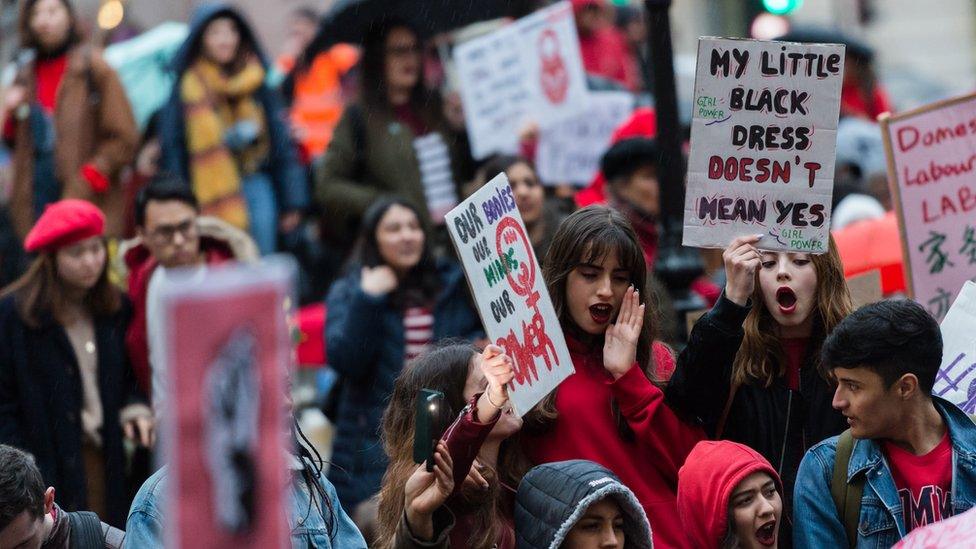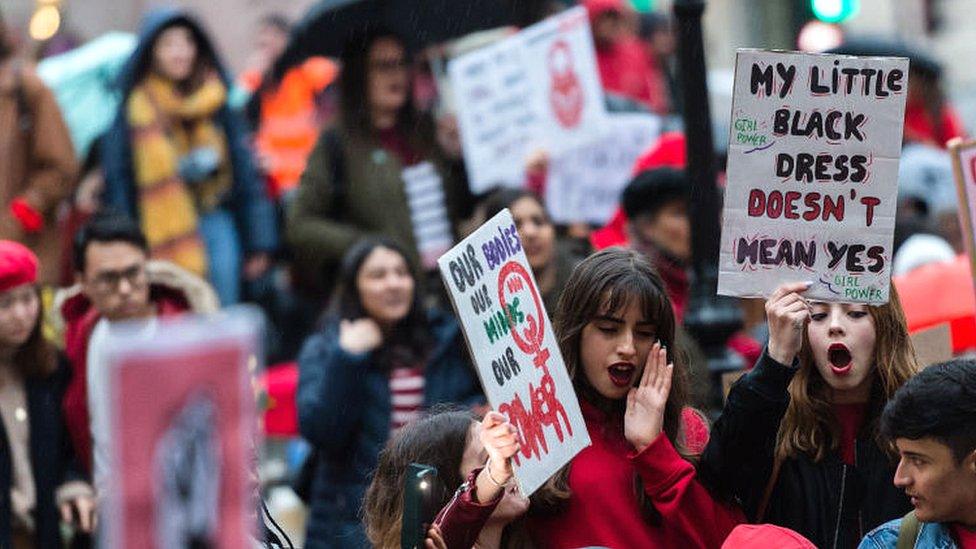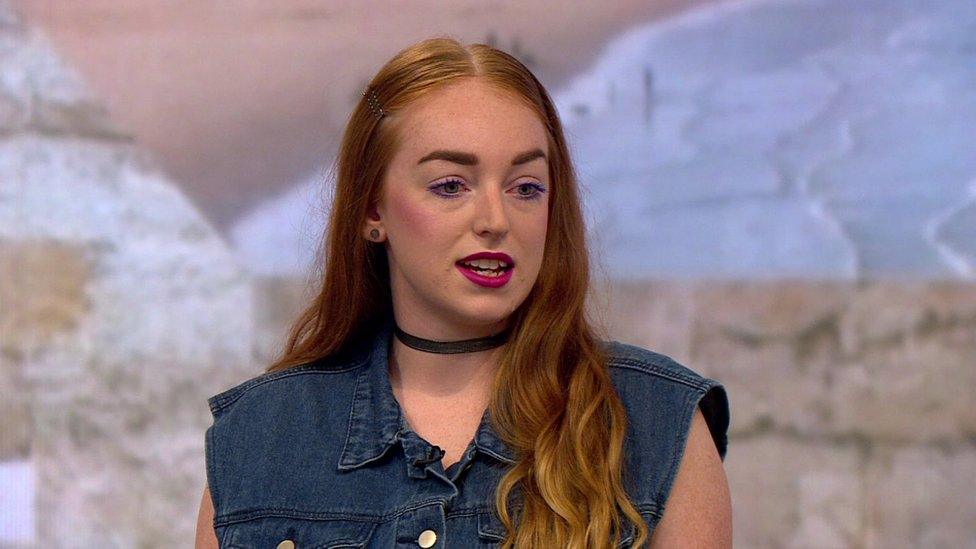Rape convictions: Justice system near 'breaking point'
- Published

Campaigners have criticised prosecutors over the failure to charge many rape cases
Rape prosecutions are being delayed for years in a justice system close to "breaking point", says a report into record-low conviction rates.
A "damning" number of cases are lost amid "under-resourced" investigations, the prosecution inspectorate said, external.
The government said the findings were "deeply concerning". Women's groups said the review failed to explain "woeful" conviction rates.
But the report rejected claims that prosecutors only charge "easy" cases.
But Sarah Green, a campaigner from End Violence Against Women Coalition, said the Crown Prosecution Service (CPS) was increasingly risk-averse and its handling of cases was causing unnecessary delays.
She highlighted a recent rape case in Liverpool case where the CPS delayed a prosecution for more than six month while they requested a victim's school records.
"They asked for those school records in a case where a woman was unconscious when she was raped, when there was a recording of part of the rape by her friends and where there was forensic evidence. And there was indeed a conviction," she told BBC Radio 4's Today programme.
The presiding judge on the case expressed concern about the amount of time between the attack and charges being laid, the Liverpool Echo reported, external.
Targets missed
The report, published by HM Crown Prosecution Inspectorate, found an average of 237 days elapsed between the first report of an offence to police and the police's first submission of the file to the CPS.
Incomplete police files caused further delays and the CPS is currently not meeting its own time targets to make decisions, the Inspectorate said.
Figures published earlier this year showed there were a record 58,657 allegations of rape in the year up to March, but only 1,925 successful prosecutions.
It is the lowest number in England and Wales since records began in 2008.
But the report said fewer rape cases are being referred by police to prosecutors - a fall of 23%.
Annie Tisshaw spoke about her experience earlier this year
Several women who say they were raped have waived their anonymity to complain about the charging decisions made by crown prosecutors.
Annie Tisshaw told the BBC's Victoria Derbyshire programme that the police investigation into her case took many months and, after being passed to the CPS, requests for further evidence led to it being dropped altogether.
The former North West chief prosecutor Nazir Afzal said it seemed as though Ms Tisshaw was the subject of the investigation rather than the alleged perpetrator.
"Resources are really, really poor. We are at breaking point," he added.
"We're beyond breaking point, actually, I think. We've got to the stage where cases are not being prosecuted with any speed."
Police and prosecutors were criticised over their handling of a case in 2017 when a student was acquitted on 12 counts of rape and sexual assault because text messages which undermined the complainant had not been disclosed.
The inspectors said cases have become more complex due to the volume of evidence from mobile phones and social media, placing more pressure on an overstretched system.
Chief inspector Kevin McGinty said the justice system as a whole is "under-resourced so that it is close to breaking point". For police, he said "it may have gone beyond that" and "the number of rape allegations lost in the investigative process is damning".
To address claims that the CPS was being too selective about the cases it prosecutes, inspectors examined a sample 250 cases.
In five of these (2%), the decision was found to be "wholly unreasonable". In 2016, the inspectors found that applied to 10% of decisions.
The inspectors said that this suggested prosecutors were improving the way they apply the test for charging or releasing suspects, rather than selecting "easy cases".
'Under huge strain'
A government spokesperson said the findings were "deeply concerning" and that "victims deserve to know they will be supported".
The government has promised more police officers, an extra £85m for the Crown Prosecution Service and longer prison sentences for sex offenders.
"Clearly there is more to do, but this government is committed to restoring confidence in the justice system and providing better support for victims," the spokesperson added.
The National Police Chiefs' Council (NPCC) said investigators were "under huge strain" and rape is "one of the most complex crimes" they deal with.
Deputy Chief Constable Sarah Crew, the NPCC lead for adult sexual offences and rape, said police were working with prosecutors to address these issues, while the government's promised 20,000 additional police officers would "ease the pressure".
And crown chief prosecutor Siobhan Blake, a CPS lead for sexual offences, told the BBC that the report demonstrates there is "no evidence that prosecutors are risk averse or that we at the CPS are choosing to prosecute easy cases".
Some women's campaigners disagree. Sarah Green said the report was "profoundly disappointing" and failed to uncover the real reasons for the decline in successful prosecutions.
The report left "many questions at the police front door" she said.
In particular she pointed to the number of cases which the CPS had decided to prosecute, which had declined faster than the number of cases referred by police to prosecutors.
- Published27 May 2022

- Published12 September 2019
